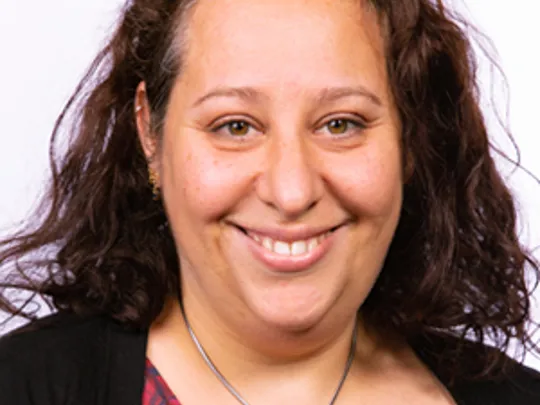of graduate employers say relevant experience is essential to getting a job with them
Why should I choose this course?
- WORK PLACEMENT (BA only) – Boost your career prospects and first-hand industry experience with a paid 48-week placement - no additional tuition fees
- RESIDENTIAL VISITS – Take on tourism projects in the UK and overseas*, with essential trip costs covered by us – past destinations have ranged from Amsterdam, Barcelona and Prague to New York, Toronto, Cyprus and The Gambia (* subject to visa requirements)
- SPECIALISE YOUR STUDIES – Gain expertise related to your career aims via optional modules such as Attraction Management or Smart Tourism and Aviation
- INDUSTRY APPROVED – Study at an ITT Centre of Excellence and work on live and simulated industry projects in association with our professional networks
- NO EXAMS - If you are not keen on exams, this course is for you. Unlike many degrees in this field, you will have no written exams during or at the end of the course and will be assessed through practical assessments and coursework only
- AWARD-WINNING UNIVERSITY – Study at the highest-ranking university in the region according to student choice (Whatuni Student Choice Awards 2023)
Our facilities
Students on our tourism courses at University College Birmingham have access to outstanding simulation facilities in our brand new Aviation and Tourism Suite. Our learning spaces on campus also provide ideal environments to build your knowledge, from lecture theatres to interactive group working spaces and extensive library resources.
Aviation and Tourism Suite
Take a look around our Aviation and Tourism Suite that features exciting simulation facilities for students on our aviation, travel and tourism courses.
Course breakdown
Students on the FdA have the option of progressing onto the final year upon completion of the foundation degree.
- Year 1
- Year 2
- Year 3
- Year 3/4
Core Modules
Digital Tourism
Exponential growth in digital technologies over the last decade has had, and continues to have, a significant impact on the tourism industry. These developments have produced a range of digital tools that are used by the tourism industry to enhance the tourist experience, improve marketing methods and empower the consumer. All of these developments will be examined in this module and through a range of innovative activities, you will develop essential digital skills in preparation for future employability.
Successful Tourism Destinations
This module will examine the critical factors driving the success of destinations, which include connectivity, government support, local community engagement and the offer of an exciting product. In addition, you will review challenges facing destinations in terms of over-tourism, implementing sustainable policies and remaining competitive over the long-term.
Dynamic Tourism Environment
This module will examine the dynamic nature of the global tourism environment and the response strategies of tourism businesses. Critical themes include the changing nature of the tourism industry and consumers, safety and security, digital technology, the ability to travel ‘freely’ (or not) around the world and how businesses are striving to implement more effective sustainable tourism policies.
Employability and Professional Development
This module will encourage you to consider a range of career paths available to you within the aviation/tourism sectors. You will consider your skills and attributes by auditing your current abilities before mapping them against those you will seek to gain during your course of study. You will have opportunities to enhance your employability and professional skills through assessment scenarios.
Core Modules
Tourism Operations and Innovation
Providing a competitive visitor experience, while generating profits, is the ultimate performance goal for tourism operators. This becomes increasingly challenging in a very competitive and dynamic environment. Accordingly, tourism operators must seek innovative solutions to performance gaps to ensure long-term success. This module will examine the current practices of tourism operators in terms of revenue management, capacity management and offering an outstanding visitor experience.
Sustainable Tourism Practices
We face many global challenges that some experts believe will harm future generations, so we have to respond now. An active global movement is demanding that we deliver more sustainable and ethical practices across all industries, including tourism. This module will explore the key criteria for sustainability and the innovative practices employed by tourism businesses and destinations.
Industry Live Project
This module will be based on an industry consultancy project with a real client. The context of the project will be based on market or operational research that will support an organisation or destination’s overall performance. This is an excellent opportunity to obtain another form of industry experience and will support you with your career aspirations.
Plus one option from:
Revenue and Performance Management
The purpose of this module is to offer insight into the rationale behind the pricing decisions taken by tourism organisations. It will examine the key sources of revenue and costs typically faced by providers within the industry and how these are managed to achieve profitable outcomes. It ultimately aims to increase your employability by using up-to-date case studies and key industry metrics and financial statements to interpret and scrutinise financial results with improved fluency and confidence.
Attraction Management
This module will examine the range and changing nature of the attraction industry (from small heritage/cultural attractions to large attractions) and the challenges facing attractions within a very competitive environment. The module will showcase how attractions have implemented innovative strategies to enhance their overall operational performance while offering a more inclusive, accessible and diverse visitor experience.
Aviation Management
This module will guide you through the exciting world of aviation management, focusing on understanding the structure of the industry, how the skies are managed, how airports work and the relationship between airports, airlines and passengers. You will be introduced to airport operations, managing the passenger experience and to key Standard Operating Procedures (SOPs) in aviation.
Work placement
Work Placement (optional – for BA (Hons) students only)
You will gain valuable work experience on a 48-week work placement. This is an exciting opportunity to put what you have learned into practice, broaden your experience and demonstrate your abilities to potential employers.
Core Modules
Tourism Trends and Futures
This module will review the strategic challenges facing destinations as they strive for sustainable competitive advantage. Various macro forces continue to influence the strategic direction of destinations with new risks and opportunities arising. Destinations are implementing more inclusive and sustainable strategies to navigate their way through a more turbulent environment. But the question remains – can destinations successfully future-proof themselves from a more uncertain future?
Strategic Change Management
In an increasingly fast-paced and changing global environment, it is more important than ever that a business can navigate its way to a successful future. This module will evaluate different strategic change management tools in supporting businesses to seize new opportunities and treat risks/threats.
Independent Research Project
This module provides you with the opportunity to demonstrate your capabilities in researching, planning and delivering an industry-related project. You can either self-select your own topic or choose from a list of contemporary industry projects. This project focuses on cultivating the desired graduate attributes of professionalism, critical enquiry, problem solving, enterprise, creativity and innovation and in enhancing your professional profile.
Plus one option from:
Crisis Communications Management
In an increasingly turbulent and dynamic global environment, it is more important than ever that businesses and destinations can manage their reputation effectively. This module will examine a range of key public relations and reputation management principles and provide you with the knowledge and skills needed to plan a successful communication campaign (media and public relations) in response to a crisis. Using an omnichannel approach, you will explore the challenges and opportunities that different media channels bring. This will further increase your employability by providing you with experience of the working practices of corporate press agencies or departments.
Visitor Experience Management
This module will focus on how tourism destinations mediate, design and deliver exciting and memorable visitor experiences, while navigating their way through a range of sensitive, digital and ethical considerations.
Smart Tourism and Aviation
This module will explore the increasingly smart approaches taken by destinations and tourism/aviation providers within an increasingly connective and smart world. Challenges and opportunities will be explored across the industries.
The modules listed above for this course are regularly reviewed to ensure they are up to date and informed by industry as well as the latest teaching methods. On occasion, we may need to make unexpected changes to modules – if this occurs, we will contact all offer holders as soon as possible.
Entry requirements
International Tourism Management BA (Hons)
A-levels: An A-level grade profile of CDD.
T-levels: A T-level graded Pass with a core component of grade C.
BTEC: A BTEC grade profile of MMP. This can be achieved from either an Extended Diploma or a combination of smaller BTEC qualifications.
Tariff: Other Level 3 qualifications are accepted at University College Birmingham for entry. A minimum of 80 UCAS Tariff points will be required.
Access to Higher Education Diploma: 80 UCAS Tariff points including a minimum of 15 Level 3 credits at Distinction.
International Tourism Management FdA
A-levels: An A-level grade profile of DD.
T-levels: A T-level graded Pass with a core component profile less than C.
BTEC: A BTEC grade profile of PP. This can be achieved from either an Extended Diploma or a combination of smaller BTEC qualifications.
Apprenticeship: Achieve an advanced apprenticeship (Level 3).
Tariff: Other Level 3 qualifications are accepted at University College Birmingham for entry. A minimum of 32 UCAS Tariff points will be required.
Access to Higher Education Diploma: 32 UCAS Tariff points.
Non-tariff: Non-UCAS Tariff-based Level 3 qualifications are also considered for entry. Please complete our enquiry form here to check your eligibility.
Work-based: We also give equal consideration to applicants who are currently in work and wish to apply to University College Birmingham. To apply, you must have a minimum of 3 years’ relevant work experience, demonstrating management or supervisory duties. Your application must also include a reference from your line manager supporting your entry to higher education. For further details, please contact Admissions.
International students
For academic and English entry requirements for EU and international students, please visit the Country Specific Information page.
Please note: As an International Student, when choosing optional placement, a visa extension may be required.
Key information
Teaching and assessment
Note: Indicative information only – actual timetables and assessment regimes will be issued at your induction.
Teaching
Example of a typical teaching week (up to 15 contact hours):
- Large group teaching – 4 hours
- Smaller group teaching – 5 hours
- Tutorials – 3 hours
- Academic and employability support – at least 2 hours
- Industry speaker sessions and employer fairs
- Field trips and visits
You will also need to commit around 20 hours per week for individual study time.
Assessment
Estimated breakdown of assessment for this degree course:
- Coursework – 48%
- Practical assessment – 52%
Our teaching and assessment is underpinned by our Teaching, Learning and Assessment Strategy 2021-2024.
Timetable
We understand that you need to balance study with work, so wherever possible your lessons will be timetabled into 2-3 days a week.
Tuition fees for home students
If you are a home student enrolling on a bachelor's or foundation degree course at University College Birmingham, the 2024/2025 academic year tuition fee for full-time study is £9,250. For part-time study, the fee is £4,625.
In 2025/2026, the full-time fee will be £9,535 per year, while the part-time fee will be £4,767.50 per year.
Tuition fees for international students
If you are an international student (or have been fee assessed as an international fee payer) and are enrolling on a full-time bachelor's degree course in 2024/2025, the fee for the academic year will be £14,000. If you complete a placement year, there will be an administration fee of £500 for a full year or £250 for a half-year placement.
In 2025/26, the tuition fee for [Band 3] courses will be £19,750 per year.
Kick-Start Scheme
As a new student studying this course full-time, you will receive £300 per year through our Kick-Start Scheme (UK students only, eligibility criteria applies). This scheme will support your studies and future career by contributing to course-related materials, uniform or selected items on campus. You may also qualify for an additional £500 per year.
Find out more about the Kick-Start Scheme here.
Unibuddy Community - meet other students on your course
Starting university is an exciting time, but we understand that it can sometimes feel a little daunting. To support you, you will be invited to join our Unibuddy Community, where you can meet other students who have applied for the same course at University College Birmingham, before you start studying here.
As soon as you have been made an offer, you will be sent an invitation email to complete your registration and join the Unibuddy Community. For more information, check out our Unibuddy Community page.
Accreditations, endorsements and partnerships
University College Birmingham works with a wide range of organisations to ensure you receive the best possible training and qualifications recognised by industry.

Have questions around your chosen subject or course content? Are you wondering what you can expect to study as part of your course? Fill out our form and chat to a lecturer.
Work placements
Work placements are vital for gaining real-life experience and for building your confidence and skills before you finish your course – and they may even lead to a job when you graduate. Our Hired team can help find the ideal placement for you.
Our four-year BA International Tourism Management course features a 48-week paid placement, during which you will not incur any tuition fees. Opportunities are available in the UK and overseas. (There is also the option to study the BA course without a placement. The placement is not included in the FdA.)
Work alongside experts in your sector
A snapshot of some of the employers we have worked with:
- Caro Hotel (Spain)
- Lisbon Bike Tour and Outdoors (Portugal)
- Coeur Des Montagnes (France)
- Brussels Marriott Hotel Grand Place (Brussels)
- Hilton Birmingham Metropole (Birmingham)
- Cherry Hills Country Club (USA)
- Hotel Alhambra Palace (Grenada, Spain)

So far, I mostly enjoy the seminars and lectures as they are all interesting and educational, my favourite module being Developing People in Tourism. Our lecturer makes sure we understand everything and involves us, asks us important questions, helps us with our assignments and points us in the right direction.
Career opportunities
The example roles and salaries below are intended as a guide only.
Tour manager
Average Salary: £27,500
Tourism officer
Average Salary: £24,500
Marketing executive (graduate)
Average Salary: £37,500
Digital marketer
Average Salary: £30,000
Project manager (graduate)
Average Salary: £39,197
Product manager (graduate)
Average Salary: £37,582
Want to take your studies to the next level? Completing the BA (Hons) degree will enable you to move onto our postgraduate courses such as International Tourism Management MSc/PGDip, Hospitality with Tourism Management MSc/PGDip (Pathway A) or Global Meetings and Events Management MSc/PGDip.

Luísa’s Story
Luísa is excelling in her career, currently managing an IT support team that ensures healthcare workers have critical data at their fingertips.
Course statistics
BA (Hons)
FdA
Meet your lecturers
















